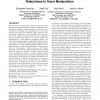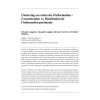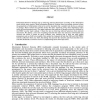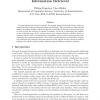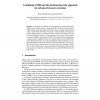107
click to vote
SIGIR
2010
ACM
15 years 2 months ago
2010
ACM
Inferring the score distribution of relevant and non-relevant documents is an essential task for many IR applications (e.g. information filtering, recall-oriented IR, meta-search,...
126
click to vote
CORIA
2009
15 years 3 months ago
2009
Relying on the Cluster Hypothesis, which states that relevant documents tend to be more similar one to each other than to non-relevant ones, most of information retrieval systems p...
109
Voted
NAACL
1994
15 years 3 months ago
1994
The normal practice of selecting relevant documents for training routing queries is to either use all relevants or the 'best n' of them after a (retrieval) ranking opera...
102
Voted
TREC
2000
15 years 3 months ago
2000
There is a reservoir of knowledge in data from the TREC evaluations that analysis of precision and recall leaves untapped. This knowledge leads to better understanding of query ex...
128
click to vote
RIAO
2000
15 years 3 months ago
2000
The Internet is a tremendous resource where one can find documents to enrich a personal information space. The question is: how can one find relevant documents and how can these b...
123
Voted
RIAO
2004
15 years 3 months ago
2004
Information Retrieval Systems aim at retrieving relevant documents according to the information needs which users express. Most Information Retrieval Systems focus on passage retr...
129
Voted
NAACL
2004
15 years 4 months ago
2004
The paper presents two approaches to interactively refining user search formulations and their evaluation in the new High Accuracy Retrieval from Documents (HARD) track of TREC-12...
115
click to vote
GVD
2004
15 years 4 months ago
2004
In some information retrieval scenarios, for example internal help desk systems, texts are entered into the document collection without proofreading. This can result in a relative...
107
Voted
ECIR
2004
Springer
15 years 4 months ago
2004
Springer
In this paper we combine two existing resource selection approaches, CORI and the decision-theoretic framework (DTF). The state-of-the-art system CORI belongs to the large group of...
110
click to vote
ADCS
2004
15 years 4 months ago
2004
Traditional information retrieval (IR) systems respond to user queries with ranked lists of relevant documents. The separation of content and structure in XML documents allows indi...
